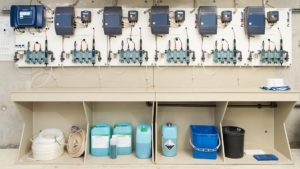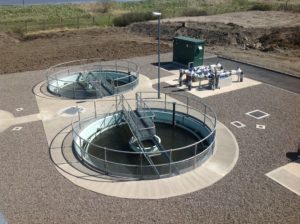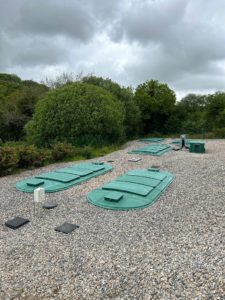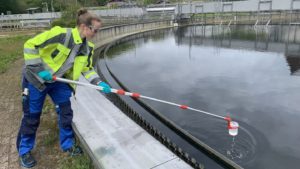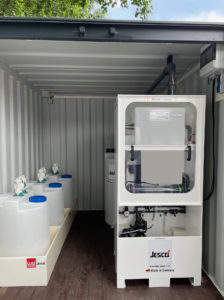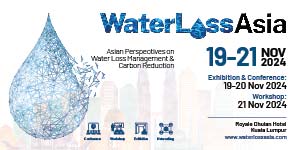Portable SAFs Ensure Environmental Protection During Upgrade
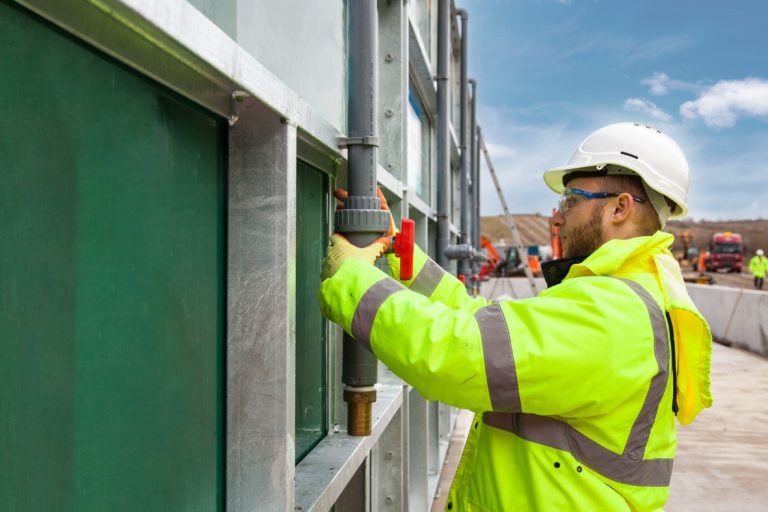
WCSEE engineer with Hybrid-SAF technology. (Image source: WCS Environmental Engineering)
Severn Trent Water is upgrading the wastewater recycling plant serving Albrighton in Shropshire, UK. Planned for the end of 2022, the project will be undertaken by the utility’s contracting partner, construction company Galliford Try. WCSEE will provide two T1000 Hybrid-SAF - submerged aerated filter - treatment units, to deliver ammonia removal at the plant while existing treatment processes are offline during the construction phase.
The SAF units will be able to treat a peak flow of 25 l/s, while maintaining compliance with environmental permit requirements for ammonia of 4mg/l ammonia. The Environment Agency’s regulations state the site must meet these standards at least 95% of the time. Modular in design, with a 30% smaller footprint than comparable technologies, the SAF units will be built offsite and are expected to be in operation at Albrighton for approximately one year. They will then be retained by Severn Trent as portable and flexible assets to be used on other sites when required.
WCSEE utilities manager Andrew Haywood said, “During a treatment plant upgrade, it is critical that stringent ammonia removal continues to be delivered while parts of the site are taken offline. This is an absolute priority for utilities – environmental compliance must be maintained throughout construction, to protect local watercourses and avoid regulatory penalties. The Hybrid-SAF tanks that Severn Trent is purchasing will deliver reliable and robust treatment, ensuring full compliance is maintained while the work is underway. The modular nature of the units means that on project completion, they can be easily removed, stored and transported to other sites when needed.”
He continued, “Having this flexibility is a major benefit for utilities – the technology can be quickly installed and commissioned, giving peace of mind that sites can remain operational and within environmental consent during planned or reactive work. We have worked closely with our client Severn Trent for 10 years, and we are very pleased to be supporting both their in-house team and their partner Galliford Try with this important project.”
Severn Trent service delivery manager Andy Bradford said: “At Severn Trent Water we have a strong reputation for operating our treatment sites to a high standard so as to provide direct environmental protection and improve the quality of our rivers. “WCSEE’s Hybrid-SAF technology will be key to keeping our Albrington works fully operational and compliant while construction, led by Galliford Try, is underway. Purchasing the units means they will be added to our asset base to be installed as required across our sites, ensuring environmental compliance at all times.”
The patented Hybrid-SAF treatment technology employs a submerged moving-bed, fixed-film reactor, which can treat wastewater with greater energy efficiency compared to traditional submerged SAFs, and in a tighter site footprint.
In spring 2022 WCSEE introduced energy-saving timers to operate the blowers that provide oxygen for the biological treatment process. The blowers are now timed to pulse air into the process rather than operate continuously, reducing the energy consumption of SAF units by up to 50 percent.
Source: WCS Environmental Engineering

